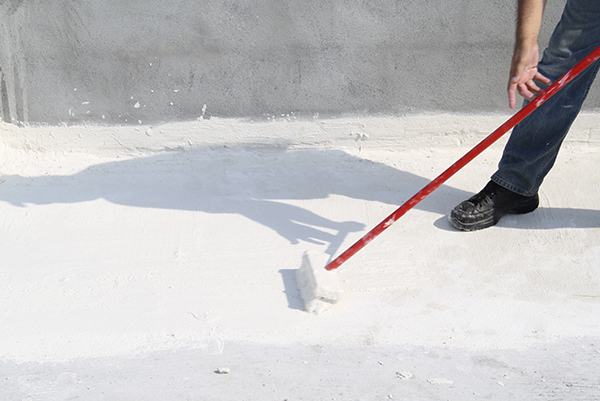The Benefits of a Roof Coating
Author: Dan Stout | February 27, 2024
For many commercial property owners, roof coatings are an affordable way to extend a roof's life, reduce energy consumption and simplify maintenance. But not every roof is a candidate for coating.
Here's what you need to know about roof coatings, their primary benefits for a commercial property and how to choose the right coating.

What Is a Roof Coating?
Roof coatings are protective membranes applied to a preexisting roof. Applied as a liquid, they're strong and flexible when dry, forming a resilient first line of defense for a commercial roof. Think of these coatings like an industrial-strength raincoat, protecting against water infiltration, ultraviolet rays and wind damage.
Property owners and managers like roof coatings because they extend the life of the roof and can potentially result in energy savings. Roofers like them because they're easy to apply — coatings are typically brushed, rolled or even sprayed on. With many colors and types of coatings to choose from, it's possible to match the needs of a range of roofing materials, conditions and budgets.
Coatings can be applied to many types of low-slope roofs. Roofs that benefit from coatings the most include:
- Metal roofs. Metal roofs especially benefit from coatings that reduce extreme temperatures.
- Built-up roofs (BUR). BUR roofs, including modified bitumen and ballast systems, can greatly benefit from a coating. Note that the gravel or other ballast will need to be removed before the coating can be applied.
- Single-ply membranes. Single-ply membranes such as TPO or EPDM are excellent candidates for coating, with a wide selection of options available that strengthen and protect the roof.
- Sprayed polyurethane foam (SPF). SPF roofs typically must be topped by a roof coating during installation and can be re-coated as needed.
- Existing roof coatings. As long as an existing roof coating is in good shape, it can be re-coated to prolong its life.
Roof Coating Benefits
Some property owners wonder why it's worth the time and money to have a roof coating installed. In general, there are three major benefits: protecting roof structure, extending roof life, and saving energy.
1. Protecting the Roof Structure
Roof coatings protect the primary roof material from a variety of environmental threats, reducing wear and tear. Coatings can even cover up some preexisting physical damage, acting as a whole-roof patch and sealing over small cracks and imperfections. The catch: They need to be applied while the roof is still in decent condition, and a coating can only protect against relatively minor damage.
Applying a coating is like treating the underbody of a car or truck: It'll protect the surface from wear and tear, but not against major collisions. And just like an underbody coating, applying a coating to a heavily damaged roof surface will only end in frustration since it can't fix major leaks or structural issues.
2. Extending Roof Life and Avoiding Tear-Offs
Because a coating protects the roof from impact and weather damage, it also extends the overall life of the roof, meaning that property owners will avoid the hassle and expense of roofing tear-offs. The labor involved in tearing off a roof is expensive, and the extensive mess and debris can be massively disruptive to anyone inside or entering/leaving the building. Additionally, waste material will need to be sent to a landfill, which can be costly and not environmentally friendly. Applying and maintaining a roof coating avoids or minimizes these headaches.
3. Energy Savings
Roof coatings can mean major energy savings for some commercial properties, especially if reflective or light-colored coatings are used. Just like a light tan sidewalk is cooler than black asphalt on a summer day, a light-tinted coating results in a cooler roof, since it doesn't take in the heat from the sun in the same way.
In fact, the US Department of Energy estimates that lighter coatings can reduce the temperature of a roof by a staggering 50°F in sunny summer weather. A lower roof temperature means the building itself will hold less heat and less energy will be spent trying to cool it. This means both energy and cost savings for your client.
Picking the Right Roof Coating
The best way to maximize the benefits of a roof coating is to take a holistic look at the building's materials, condition and environmental setting, along with the property manager's needs.
For example, a shaded roof prone to ponding water would benefit from a silicone-based coating, which will excel at resisting moss growth and water infiltration. But for a roof exposed to full sun and arid weather, a better choice might be a fibered aluminum coating, which can boost energy savings and is more budget-friendly.
When it comes to what roofing materials work best for a property, there are a number of factors to consider. Keep these benefits in mind if your client is looking to get more out of their roof.